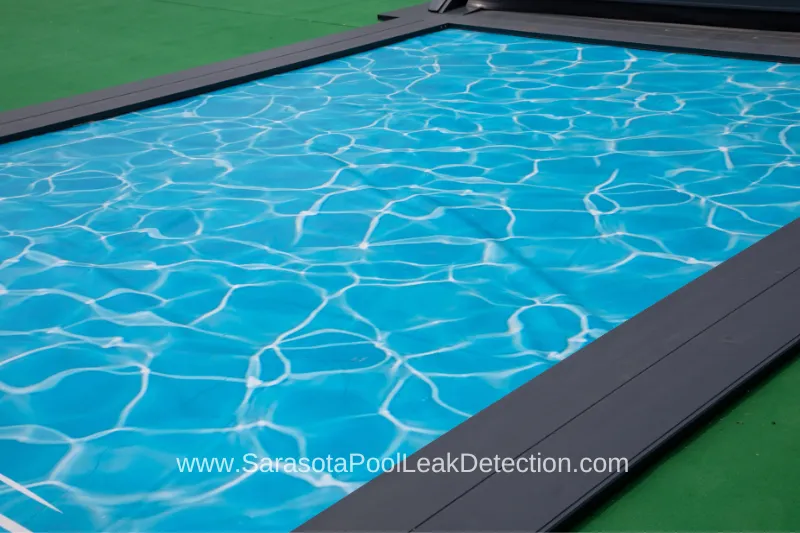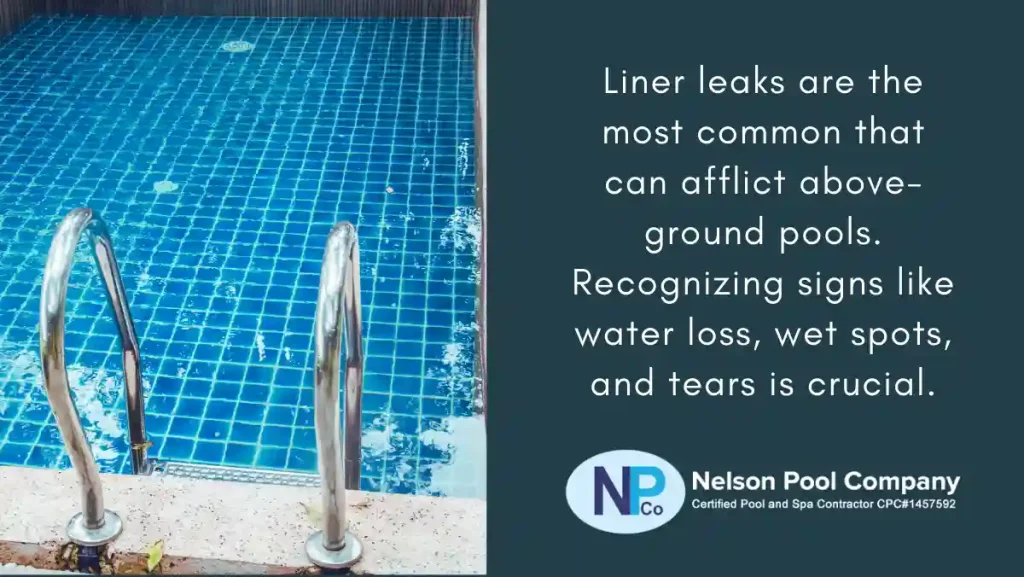Above-ground pools have become a staple in backyards nationwide, offering an affordable and convenient way to enjoy swimming right at home. These pools, ranging from simple inflatable setups to more elaborate framed designs, provide families with endless fun and relaxation.
However, like all good things, they come with their own set of challenges. One of the most common issues faced by above-ground pool owners is the dreaded pool leak. These leaks can range from minor nuisances to major problems, potentially leading to significant water loss and damage.
This article delves into the world of above-ground pools, explicitly focusing on the most prevalent type of leak owners may encounter. From understanding the subtleties of a pool liner leak to mastering the techniques of leak detection and repair, this article aims to be your go-to guide for all aspects of above-ground pool care.

The Most Common Leak – Pool Liner Leak
Liner leaks are the most common that can afflict above-ground pools. Understanding these leaks’ causes, signs, and potential impact is crucial for any pool owner.
Why are Liner Leaks So Common?
Material Vulnerability
Pool liners, typically made from vinyl, are susceptible to damage from various sources. They can tear or puncture from sharp objects, heavy usage, or pets.
Age and Wear
Over time, the liner material can become brittle and lose its elasticity, making it more prone to cracking, especially in areas of high stress, like corners or around fittings.
Improper Installation or Maintenance
Poor installation can leave weak spots in the liner. Likewise, inadequate maintenance, such as improper water chemistry, can accelerate the degradation of the liner material.

How Do Liner Leaks Occur and What Signs to Look For?
Physical Damage
The most direct cause of a liner leak is physical damage, such as tears or punctures. This can happen due to debris, rough play, or equipment damage.
Weathering and Aging
As the liner ages, it can develop tiny cracks or holes, particularly in areas exposed to high sunlight or temperature fluctuations.
Signs of a Liner Leak
The most obvious sign is a noticeable drop in the water level. Other indicators include:
- · Wet spots around the pool area.
- · Visible tears or separations in the liner.
- · Persistent air bubbles in the pool system.
Impact of a Liner Leak on Pool Integrity
Structural Damage
A leak in the liner can lead to water seeping behind the liner, which can cause damage to the pool walls, the frame, or the surrounding area.
Water Loss and Cost Implications
Consistent water loss not only adds to water bills but can also disrupt the chemical balance in the pool, leading to additional maintenance costs.
Compromised Safety
If left unaddressed, a severe liner leak can weaken the pool’s structure, potentially leading to a collapse or a significant failure, posing safety risks.

Understanding Above Ground Pool Leaks
Owning an above-ground pool is a delightful experience, offering a private oasis for relaxation and fun. Yet, the secret to consistently relishing this delightful luxury lies in diligent and thorough pool maintenance.
Keeping your pool well-maintained not only guarantees a secure and pristine swimming space but also prolongs its life. A crucial part of this upkeep is attentively tackling the frequent problem of pool leaks. These leaks can arise in above ground pools for a myriad of reasons and may appear in various sections of the pool.
Leaks in above-ground pools can occur for various reasons and can manifest in different parts of the pool. Understanding these leaks is crucial for timely intervention and repair, preventing minor issues from escalating into significant problems. Here, we break down the common types of leaks you might encounter with your above-ground pool:
Liner Leaks
- The pool liner is vital to your above-ground pool, acting as a barrier to keep the water contained. Liner leaks are the most common type and can be caused by age, wear and tear, or physical damage.
- Signs of a liner leak include unexplained drops in water level, wet spots around the pool, or visible tears in the liner.
- Regular liner inspection for signs of wear or damage is essential to pool care.
Hose Leaks
- Hoses connect different parts of the pool’s filtration system. Over time, they can develop leaks due to loosened connections, cracks, or deterioration.
- Symptoms include water pooling around the hose connections or visible drips when the pump runs.
- Regular checks of hose integrity and tightness of connections can help in early detection and repair of hose leaks.
Skimmer Leaks
- The skimmer is responsible for pulling water into the filtration system. Leaks are often due to a broken seal or cracks in the skimmer housing.
- Indicators of a skimmer leak include consistent air bubbles in the pump or pool or water levels dropping more rapidly than usual.
- Inspecting the skimmer regularly for cracks and ensuring the seals are intact is crucial in leak prevention.

Detecting and Repairing Liner Leaks
Detecting and repairing liner leaks in above-ground pools is essential to maintaining longevity and ensuring safe, enjoyable use. Early detection can prevent minor issues from escalating into major problems, saving time and money in the long run.
Detecting Liner Leaks
Visual Inspection
Regularly inspect your pool liner for any signs of damage, such as tears, holes, or cracks. Pay special attention to areas around fittings, ladders, and corners.
The Bucket Test
To confirm a leak, use the bucket test. Fill a bucket with pool water and place it on a pool step, marking the water level inside and outside the bucket. After 24 hours, if the pool water level has dropped more than the water inside the bucket, there’s likely a leak.
Dye Test
A dye test can efficiently pinpoint the exact location of a leak. Turn off the pool’s circulation system and use a syringe or dropper to apply dye near the suspected leak area. If there is a leak, the dye will be drawn towards it.
Repairing Liner Leaks
Small Tears or Punctures
For minor damage, patch kits designed for vinyl liners can be used. These kits typically include a piece of vinyl and a unique adhesive that works underwater. Clean the area around the leak, cut the vinyl patch to size (ensuring it covers it adequately), and apply it according to the manufacturer’s instructions.
Larger Tears or Deterioration
If the damage is extensive or the liner is significantly deteriorated, it might be necessary to replace the entire liner. This is a more complex process and might require professional assistance.
Preventive Measures
To prevent future leaks, avoid sharp objects near the pool, maintain proper water chemistry, and consider using a pool cover to protect the liner from environmental elements and debris.
Impact of Unaddressed Leaks
Neglecting a liner leak can lead to more significant issues. Water seeping behind the liner can cause rust on metal components or rot in wooden frames. Over time, this can compromise the pool’s structural integrity, leading to more costly repairs or even necessitating a complete replacement.
Please include attribution to https://sarasotapoolleakdetection.com with this graphic.
Preventing Future Leaks
Maintaining the integrity of your above-ground pool and preventing future leaks involves a combination of regular maintenance, proper usage, and periodic professional inspections. By adopting these preventive measures, you can significantly reduce the risk of leaks and ensure the longevity of your pool.
Regular Maintenance to Prevent Leaks
Routine Inspections
Conduct regular inspections of your pool liner and components. Look for signs of wear, tear, or damage, especially after extreme weather conditions or heavy usage periods.
Proper Water Chemistry
Keep the water chemistry balanced. Imbalanced pH, chlorine, or other chemical levels can quickly deteriorate the liner and other pool components.
Avoiding Physical Damage
Be cautious about using pool toys and cleaning equipment, and avoid sharp objects in and around the pool. Educate family members and guests about the importance of treating the pool gently to prevent accidental punctures or tears.
Role of Pool Covers
Protection from Debris
Using a pool cover when the pool is not in use helps to keep out debris, which can cause damage or clog the filtration system, leading to increased pressure and potential leaks.
Reducing Sun Exposure
Pool covers can also protect the liner from prolonged exposure to sunlight, which can cause the material to break down over time.
Regular Inspections
Self-Inspection
Regularly check the pool’s filtration system, hoses, and connections for signs of wear or leakage.
Professional Inspections
Consider scheduling annual or bi-annual professional inspections, especially if you are not confident identifying potential issues. Pool professionals can offer a more thorough examination and spot problems that might be missed otherwise.
Maintaining Proper Chemical Balance
Regular Testing
Test your pool water regularly and adjust the chemicals to maintain the recommended pH, alkalinity, and sanitizer levels.
Using Quality Chemicals
Invest in high-quality pool chemicals and follow the manufacturer’s guidelines for their use.
Seeking Professional Help When Needed
Complex Repairs
If you encounter a complex leak or are unsure of the cause, it’s wise to seek professional help. Pool repair professionals have the experience and tools to diagnose and fix issues efficiently and effectively.
Regular Service Contracts
Consider a regular service contract with a pool maintenance company for peace of mind. They can handle the regular upkeep and alert you to any potential issues before they become significant problems.
We cannot overemphasize the importance of promptly addressing pool leaks. Neglecting even minor leaks can lead to more significant issues, potentially resulting in costly repairs and compromising the safety of your pool.
Caring for your above-ground pool requires diligence, but it doesn’t have to be a burden. If you’re unsure about any aspect of pool maintenance or need professional repair assistance, help is just a phone call away.
Call (561) 570-1269 now, and we will schedule a pool repair and renovation company in your area to contact you. Or, if you prefer, fill out this form, and we will have the best pool renovation company in your place contact you. Don’t let pool leaks dampen your enjoyment of your backyard oasis. Act today and ensure many more safe, fun swimming seasons for you and your family.
